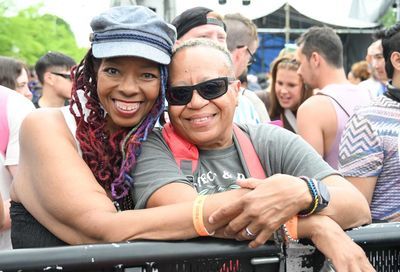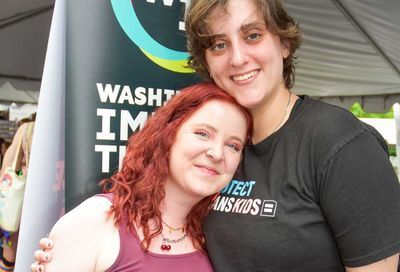AIDS Walk's Last Stand?
September 1992.
As thousands of marchers wend their way through Washington’s streets, the clouds that had started the morning a bit ominously break apart for sun. Thousands of people troop down the 1600 block of Pennsylvania Avenue as the AIDS Walk moves along its route. One of the walkers breaks free of the crowd and jumps atop a concrete security pylon directly in front of the White House.
“Hey hey, ho ho, George Bush has got to go! ” he yells, clapping his hands and encouraging the crowd. The throngs of marchers join in eagerly. AIDS Walk is not, of course, an explicitly political event — it’s a fundraiser for Whitman-Walker Clinic and an opportunity to educate people about the disease. But let’s face it, folks, there’s an epidemic on and people are dying, and the guy in charge at the White House here only wants to talk about “innocent victims, ” and his political party wouldn’t even let his wife wear an AIDS ribbon at his own nominating convention. Congress will hand over money for treatment, although Jesse is doing his damnedest to make sure no one uses it to promote homosexuality and other unnatural behavior. And it’s an election year, now’s the time to make things happen, to vote in a president and a congress who will do the right thing. You can’t have an AIDS Walk and not be political.
But it’s not as much politics as it is passion. AIDS Walk is an event — the event — that can bring so many different people together. The Quilt is for mourning. ACT UP is for anger. Pride is for coming out and being ourselves. But AIDS Walk is about support in a crisis, about raising the resources to take care of ourselves and our loved ones. It’s why the streets are filled.
Flash forward nine years, September 2001.
Everything has changed, of course, the country dazed from the shock of September 11. AIDS Walk has the not-so-welcome distinction of being the first public event to be held on the Mall since the towers fell and the Pentagon burned, and fear of another terrorist attack feels perfectly rational and justified. The turnout for the once gigantic event is predictably small — just 3,500 show up to walk.
|
But while in many ways everything had changed on September 11, 2001, everything about AIDS had been changing for years before. New drugs were radically improving and lengthening the lives of people with AIDS — as long as they could get them. Money from the government flowed more freely, though not, some would argue, nearly freely enough. Politicians still battled over homosexuality, but the vituperative tactics of Helms and Co. had lost some sting. We had entered what some doctors and scientists called the “treatment era ” — a new phase of the AIDS epidemic where we could focus less on death and more on life.
And as AIDS changed, AIDS Walk changed.
Since 1997, Whitman-Walker has seen at least some drop in attendance and money raised in each year’s AIDS Walk. But even with that general trend, the first two years of the new decade have been particularly rough. Where in 1999 AIDS Walk raised about $1.5 million for the Clinic’s AIDS programs, AIDS Walk 2000 dropped by almost half, to just over $850,000. That was nearly halved again in 2001, with the event pulling in less than $500,000.
And these trends aren’t confined to AIDS Walk Washington, says Whitman-Walker’s Executive Director Cornelius Baker, who points to AIDS Walks in New York, Los Angeles and Seattle that have watched their returns drop. However, while Seattle experienced yet another difficult year, the New York and Los Angeles Walks rebounded in 2002.
“The question is will we be like Seattle or New York, ” Baker says.
Whether the AIDS Walk rebounds or not for 2002 is, perhaps, of more vital importance than at any other point in the event’s 16-year history — if AIDS Walk doesn’t meet its fundraising goal of $850,000, Baker says, the Clinic will face “severe budget reductions. ” That means possible cuts in programs, waiting lists for services, and staff layoffs. In the days leading up to the Walk, it’s too early to tell if the Clinic will meet that goal. Director of Development Tim Turnham says that initial tallies show more than $200,000 already raised, but the bulk of any money raised will come in on the day of the Walk.
AIDS Walk is one of three events that previously accounted for sixty percent of Whitman-Walker’s philanthropic income, says Turnham. Of the other two events, only the AIDS Marathon remains. AIDS Ride came to an end this year as the event’s private-sector coordinator, Palotta TeamWorks, essentially closed its doors in the face on ongoing controversy about the extremely high fundraising costs of the events.
The AIDS Ride controversy raged for months in national and local media, and major AIDS service providers cut ties with Palotta to launch their own bicycle-based events. The controversy has cost the Clinic one of its major fundraisers, and spillover from the controversy has affected the AIDS Walk. With the similarity of the names of the events, some people who are distrustful of AIDS Ride are assuming the Walk is produced by the same company, although the AIDS Walk has never been associated with Palotta TeamWorks.
“We’ve [heard] from AIDS Walkers who have been trying to raise money, and people are saying they won’t support a Dan Palotta event, ” says communications director Michael Cover.
The conflation is particularly frustrating, says Baker, because the AIDS Ride Washington had few problems with expense overages, in part because the Clinic took an active role in the event. But the current climate of business and charity scandals, from Enron to the United Way, he says, have fostered a “distrust of institutions. ”
But perhaps a deeper reason for the decrease in money and participation has simply been the radical change in environment — for better or for worse, the crisis mentality is simply not present in 2002 as it was in 1992, or any of the early years of the epidemic. As death rates have fallen with increases in treatment, approaches to AIDS have changed.
“The environment was one where people were dying, ” says Baker. “People think about AIDS differently now than prior to 1997. ” But Baker points out that the very success of treatment has led to an increased need for financial support from the community. With successful treatment, more people are living with HIV than ever before, creating an even larger demand for the AIDS programs Whitman-Walker — and every other AIDS service organization — provides.
Following last year’s low AIDS Walk returns, Whitman-Walker was able to avoid cutting services and staff, Baker says, because the Clinic finished the 2001 fiscal year with a surplus. The United Way and Combined Federal Campaign (CFC) also went a long way toward making up the shortfall. But with a surplus no longer part of the picture, and the recent accounting scandals with United Way possibly decreasing United Way/CFC participation, a poor performance for AIDS Walk could lead to the end of the event.
“We are going to have to examine very carefully whether it’s a viable event, ” says Cover. “We’re not ready to make the decision today that we won’t have a walk [in the future]. But we have to be realistic. ”
Should AIDS Walk come to an end after this year, it wouldn’t be the first fundraiser to succumb to declining participation and changing environments. This Saturday, at the same time as AIDS Walk, the National Kidney Foundation of the National Capital Area is holding a Kidney Walk fundraiser along the C&O Canal in Georgetown. The Walk will be the first the organization’s held since the mid-nineties when, after the event moved to a new location because flood damage to the canal, it was cancelled because of decreased participation, says Foundation president Tony Englert.
“If we have five hundred people [this year] we would be pleased, ” Englert says of the walk, part of a new national effort. But not all fundraisers come back.
One of the largest fundraisers for the Kidney Foundation, Englert says, was an annual volleyball marathon, but interest waned and that event came to an end as well.
Fundraisers have lives, Englert says, and those lives sometimes end.
Whether AIDS Walk finds itself at an end won’t be known until the final walker finishes the day and the last donation is tallied. But the life of AIDS Walk is the community that creates and supports it. And if this should prove to be AIDS Walk’s last stand, Baker says the Clinic will continue to work to find ways to reach out to communities to support the Clinic’s cause.
“It’s not the [event] that raises money, ” Baker says. “It’s the opportunity to give. People give money because someone they know asks them. ”
If AIDS Walk 1992 was about a community supporting itself and its loved ones during a terrible crisis, then perhaps, as AIDS Walk 2002 approaches what could be its last stand, it will once again be the event that brings so many different people together.
Maybe, once again, it will fill the streets.
AIDS Walk will be held this Saturday, October 5, beginning with a pre-Walk rally at Freedom Plaza (14th and Pennsylvania Ave., NW) at 8:30 a.m. The Walk begins at 9:30 a.m. from Freedom Plaza. For more information go to www.aidswalkwashington.org.
Support Metro Weekly’s Journalism
These are challenging times for news organizations. And yet it’s crucial we stay active and provide vital resources and information to both our local readers and the world. So won’t you please take a moment and consider supporting Metro Weekly with a membership? For as little as $5 a month, you can help ensure Metro Weekly magazine and MetroWeekly.com remain free, viable resources as we provide the best, most diverse, culturally-resonant LGBTQ coverage in both the D.C. region and around the world. Memberships come with exclusive perks and discounts, your own personal digital delivery of each week’s magazine (and an archive), access to our Member's Lounge when it launches this fall, and exclusive members-only items like Metro Weekly Membership Mugs and Tote Bags! Check out all our membership levels here and please join us today!
























